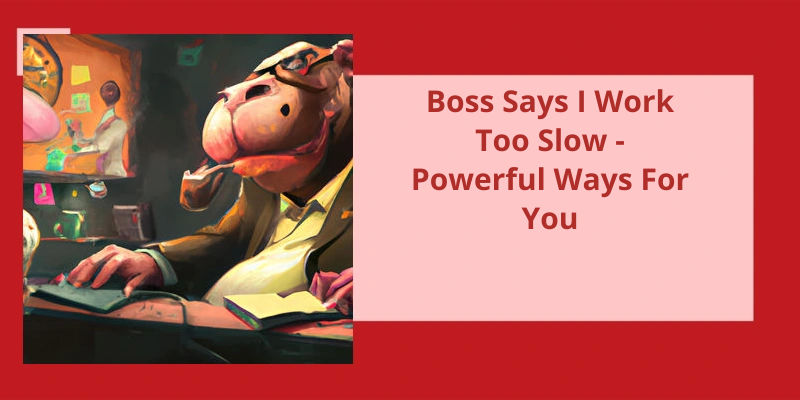If your boss says you are slow, what should you do?
It is important to take responsibility for your own performance and to be proactive in addressing any issues that your boss may have with your work. Taking the time to mentally prepare yourself, think before you react, and ask for a performance improvement plan can help you to address any issues that your boss may have with your work.
Keeping the communication open and seeking training and education can help you to improve your performance and meet your bosss expectations. Additionally, asking friends or co-workers for an assessment can provide you with valuable feedback and help you to identify areas of improvement. Taking the time to address any issues that your boss may have with your work can help you to be successful in your job.
If you are slow at work, what should you do?
Taking the time to review your work, pursue professional development, clean and organize, create a budget, get creative, update your resume, reach out to peers in your industry, and manage your email during a slow day at work can be a great way to stay productive and make the most of your time.
Taking the initiative to use a slow day at work to review your work, pursue professional development, clean and organize, create a budget, get creative, update your resume, reach out to peers in your industry, and manage your email can help you stay productive and make the most of your time. Doing so can help you stay ahead of the game and be prepared for future opportunities.
What would you say to an employee if they are working too slowly?
Listening to your employees is an important part of being a successful manager. By taking the time to listen to what your employees have to say, you can better understand why they are moving slowly and how to help them. This will help create a better working environment and ensure that your employees are productive and successful.
Taking the time to listen to your employees and ask them why they are moving slowly can help you better understand the situation and come up with a solution. Common reasons for slow progress include feeling overwhelmed, being a perfectionist, or not being able to focus due to interruptions. By addressing these issues, you can help your employees become more productive and successful.
Can we take things slow at work?
Taking your time to complete tasks is a much better approach than rushing and trying to be a perfectionist. Not only will you be more focused and achieve higher quality, but you will also save your energy for more important tasks.
Working too hard and trying to be perfect can be detrimental to your health and productivity. It is important to take your time and be mindful of the tasks you are completing. Doing so will help you stay focused and achieve higher quality results.
What strategies can you use to slow down your work and avoid making mistakes?
multitasking is not an effective way to get things done. To be more productive, it is important to eliminate distractions, use a task tracker or checklists, automate task workflows, clarify and ask questions, review your work, get a second set of eyes, and take breaks and refresh with a mental pause.
Overall, it is important to be mindful of how you are managing your tasks and time. By following the tips outlined above, you can be more productive and efficient in your work. Taking the time to eliminate distractions, use task trackers, automate task workflows, and take breaks can help you to be more successful in your work.
What steps can I take to improve my productivity and efficiency at work?
Working faster is a skill that can be developed with practice. By using a timer, making a plan, organizing your workspace, minimizing distractions, prioritizing tasks, dividing your life into smaller parts, grouping similar tasks, and putting an end to procrastination, you can become more efficient and productive.
Working faster is an important skill to have in todays fast-paced world. By following the steps outlined in this article, you can become more efficient and productive. With practice and dedication, you can learn how to work faster and achieve your goals in less time.
What is causing some people to be slow at work?
it is important to recognize that an employee can work slower than their colleagues due to a variety of reasons. It is important to identify the root cause of the issue and address it in order to ensure that the employee is able to work at the same pace as their colleagues.
Overall, it is important to understand that an employee can work slower than their colleagues for a variety of reasons. It is important to identify the cause of the issue and address it in order to ensure that the employee is able to work at the same pace as their colleagues. By doing so, it will help to ensure that the employee is able to reach their full potential and contribute to the success of the organization.
What strategies do you use to manage working with slow people?
It is important to remember that if a slow coworkers performance does not affect you, it is best to simply ignore them. However, if they are causing you problems, it is important to talk to them before going to your supervisor.
it is important to be aware of the performance of your coworkers and to address any issues that arise. If a slow coworker is causing you problems, it is best to talk to them before going to your supervisor. This will allow you to hear their explanations and suggest solutions.
When work is slow, what should be done with employees?
A team leader can help a slow-moving employee improve their pace of execution by talking with the employee, teaching project management skills, making changes to improve their focus, providing time-saving tools, and creating a feedback loop. These strategies can help the employee become more productive and efficient in their work.
A team leader has the power to help a slow-moving employee become more productive and efficient in their work. By talking with the employee, teaching project management skills, making changes to improve their focus, providing time-saving tools, and creating a feedback loop, the team leader can help the employee improve their pace of execution.
What strategies can you use to encourage someone to work at a faster pace in a professional manner?
There are many ways to professionally tell someone to work faster. Setting an example, identifying bottlenecks, proposing solutions, meeting with them one-on-one, making it a game, letting them shadow other employees, letting them monitor their performance by themselves, and breaking down big projects into smaller assignments are all effective strategies.
Overall, it is important to be professional when telling someone to work faster. By following the tips outlined in this article, you can ensure that you are communicating in a respectful and effective manner. With the right approach, you can help your employees increase their productivity and reach their goals.
What strategies do you use to work with slow coworkers?
Dealing with a lazy coworker can be a difficult and frustrating experience. However, by following the 10 tips outlined in this article, you can effectively cope with the situation and maintain a positive attitude. By not letting your feelings fester, being more assertive, offering guidance, and talking to someone, you can help to improve the situation.
It is important to remember that dealing with a lazy coworker can be a difficult and challenging experience. However, by following the 10 tips outlined in this article, you can effectively cope with the situation and maintain a positive attitude. By not enabling them, not gossiping, and keeping a good attitude, you can help to improve the situation and create a more productive work environment.
Is it acceptable to take time to adjust to a new job?
Transitioning to a new career can be a daunting task. However, with patience and reasonable expectations, it is possible to make a successful transition. It is important to remember that the transition process can take anywhere from three months to a year, so it is important to be patient and not get discouraged if it takes longer than expected.
Overall, transitioning to a new career is a process that requires patience and dedication. It is important to keep expectations reasonable and to remember that the transition process can take anywhere from three months to a year. With the right attitude and dedication, it is possible to make a successful transition and find success in a new career.
Conclusion
In conclusion, I understand that my boss believes I work too slow and I am committed to improving my speed and efficiency. I am confident that with practice and dedication, I will be able to increase my productivity and meet my boss's expectations. I am grateful for the feedback and I am eager to continue to grow and develop in my role.






